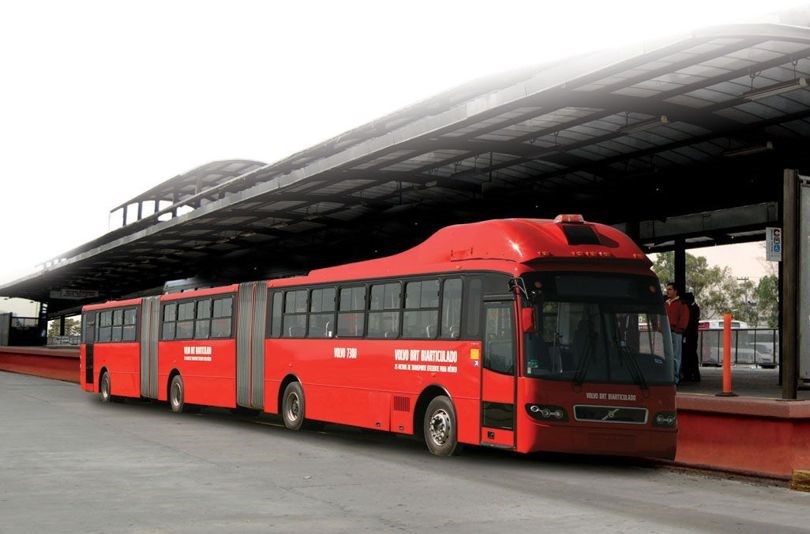A biweekly roundup of automotive news, good, bad and just plain weird:
Volvo sends world’s longest bus to Brazil
As clean-running as electric vehicles are, the most efficient way to transport people around is in mass-transit solutions like the bus.
If you’d like to get around Brazil quickly, Volvo’s got your solution.
It’s called the Gran Artic 300, and it’s absolutely massive. Imagine another section added onto a B-line bendy bus, and you basically have the concept; capable of hauling 300 passengers, the Gran Arctic is like an airliner for the road.
If this seems like a bad idea in modern traffic, consider that a superbus like this would probably run along only the busiest routes, and take three or more buses off the road. Also, it’s not like running between Brazilian suburbs is like trying to get through downtown Vancouver in rush hour.
Europe plans new fast-charging EV stations
What’s the biggest impediment to the electric car? It’s not the range or the technology, it’s the charging. If you have a gasoline-powered machine, you don’t have to worry about filling up, you just stop wherever there’s a station. With an EV, you need to plot your route, and make sure you don’t forget to put the car on the charger when you get home.
However, if the new agreement between Mercedes-Benz, BMW, Ford, and VW gets off the ground, European EV owners will be one step closer to traipsing around the continent without a care in the world. All four manufacturers have signed a memorandum of understanding with plans to build 400 such stations, adding to Europe’s growing network.
More than twice as powerful as Tesla’s Supercharger fast-charger, these stations would allow you to quick-charge your EV in about the time it takes to have a coffee and check your email on your phone.
Porsche sets sales targets for Mission-E
In many ways, the Tesla Model S effectively replaced the Porsche 911 as the official car of business success. Yes, the rear-engined Porsche coupe was also about racing heritage, but new 911 owners often came from the Gordon Gekko world of big bonuses and corporate takeovers.
As the 911 expanded into its current form, basically a grand tourer, it left the door open for upstart manufacturers like Tesla to come along with a new definition for showing status. Don’t believe me? Just watch the traffic coming into downtown over the Lion’s Gate Bridge these days – where once there were whale-tailed 911s, now it’s mostly super-fast electric sedans.
So, what’s Porsche to do? Wield the might of their massive R&D department and come up with their own take on the performance EV. Dubbed the Mission-E, the current concept is a 590 horsepower dual-motor machine that’s slicker on the exterior than the Model S, and will likely have the edge in handling. The Model S has all the straightline speed you could want, but Porsche has a lot more experience in designing traction control systems set up for cornering.
In interviews with German newspaper Automobilwoche, Porsche CEO Oliver Blume indicated a target of 20,000 cars per year world-wide, or roughly two-thirds of total 911 sales. That’s an ambitious goal, but one reasonably achievable with Porsche’s huge global distribution network.
Further, Porsche is reportedly considering a hybridized version of the 718 Cayman. Not everyone is a fan of the new Boxter/Cayman turbo-four that replaced the sweet-sounding flat-six, but a plug-in hybrid version might not be so crazy. After all, Porsche won the 24 Hours of Le Mans endurance race this year in a turbocharged four-cylinder hybrid: a little Le Mans for the street? Sounds like a proper Porsche to me.
Hacker takes down transit system
Expect this sort of thing to happen more often. Last weekend, an anonymous hacker managed to break into the San Francisco Municipal Transportation Agency system, activating a ransomware program. $73,000 was demanded in order to unfreeze the system.
Thus, free rides for everyone. The hack cost an estimated half-million dollar loss in fares, but the transport agency had the fare machines up and running again after a day or so.
Attempts to track down the hacker have led to Russia or possibly Iran, but no arrests have been made. With more and more connectivity built into everything we own and use, maybe this is a good reminder to back up your data lest your personal computer suffer the same fate.
Watch this space for all the week’s best and worst of automotive news, or submit your own auto oddities to [email protected].



